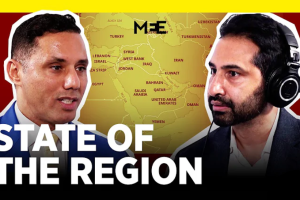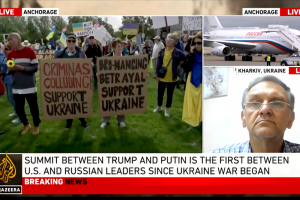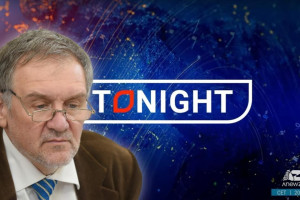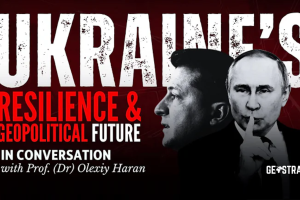Is War the New Normal in Ukraine?
Hello this is Ukraine Calling. A weekly roundup of what’s been happening in Ukraine, with a focus on a main issue. I’m Marta Dyczok for Hromadske Radio in Kyiv, and here are the headlines that caught my attention this week.
Headlines
oleksiy_garan_0.jpg

This week’s news began with Donald Trump’s shocking statement that he might look at recognizing Russia’s annexation of Crimea, his odd commentary that Putin was not in Ukraine, and then blaming Obama for that whole part of the world being a mess. Meanwhile, war continued on Ukrainian territory. Three Ukrainian soldiers were killed over the past seven days, and twenty five were injured.
Last week the OSCE Special Monitoring Mission in Ukraine reported a 25% increase in hostilities.
Pilot-turned MP Nadiya Savchenko announced that she was going on a new hunger strike this Tuesday. That she would not eat until all war prisoners were released.
Hromadske Radio’s leaders travelled to the area near the war last weekend, to the town Volnovakha. They met with listeners, potential listeners, city officials, and local journalists.CEO Andriy Kulykov said that shelling could be heard, and that while people have adapted, they want peace.
Sadly, war seems to have become the new normal in Ukraine. We’ll bring you more on that with expert commentary by Professor Olexiy Haran and Journalist/Analyst Brian Whitmore later in the show.
Anti-corruption
Two high level officials from the previous Yanukovych regime made the headlines in Ukraine this week. Oleksander Yefremov was detained in Kyiv’s Boryspil airport on Saturday, as he was attempting to leave the country. He once headed up the Regions Party parliamentary faction, that’s the party of former now fugitive President Yanukovych. Yefremov is facing charges of embezzlement of state funds, inciting hatred, and taking actions aimed at violating the territorial integrity of Ukraine.
The other name from the past that reappeared in the news this week was Mykola Azarov. He was Yanukovych’s Prime Minister from2010 through January 2014. This week was called in for questioning by Ukraine’s new Prosecutor’s Office. The case is about embezzlement of state funds in the gas sector. It’s unlikely that Azarov will show up in the Kyiv Court, since he fled to Russia along with Yanukovych back in 2014. His international assets have been frozen, Interpol put him on their wanted list. Azarov’s son, Oleksiy, has also been summoned.
Three judges were dismissed this week by President Poroshenko, on the recommendation of the Supreme Justice Council. Natalia Maltseva and Natalia Spasova from Donet’sk, and Vladyslav Oberemko from Kyiv, were all accused of breach of oath.
Single Registry for IDPs created
A new single registry for internally displaced people was launched on the first of August by Ukraine’s Ministry of Social Policy. The aim is to centralize information about those displaced from Crimea and the Donbass. Until now, lists were kept by various authorities. This led to confusion, and occasional double dipping of state services. Now the Ministry is creating an electronic database to better serve those in need, although this is still in the trial phase.
Stepan Bandera Avenue in Kyiv now Official
And it’s now official – Kyiv has a Stepan Bandera Avenue. You’ll remember in July Ukraine Calling reported that City Council had voted to rename Moscow Avenue, and that the Kremlin protested. But Kyiv’s mayor was away on vacation. This week Vitaliy Klychko returned, signed the decision, and made it official.
brian_whitmore.jpg

Focus
Dyczok: Last Sunday US Presidential Candidate Donald Trump made even more waves than usual. In an ABC TV interview he suggested that he might ‘look at’ recognizing Russia’s annexation of Crimea, and that he, meaning Russian President Putin, was not in Ukraine. Meanwhile, in eastern Ukraine, war continues, and appears to be escalating, but is no longer making international headlines. To speak about these issues we have with us in studio Olexiy Haran, Professor of Political Science, National University of the Kyiv Mohyla Academy, and the Head of Research, Democratic Initiatives Foundation.
And joining us from Prague via skype is Brian Whitmore Senior Russia Analyst for Radio Free Europe/Radio Liberty in Prague. He is the author of The Power Vertical Blog and host of The Power Vertical Podcast, both of which focus on Russian affairs.
Thank you both for joining us.
I’d like to start with Professor Haran. You know that last Sunday Donald Trump, said, “the people of Crimea, from what I’ve heard, would rather be with Russia than where they were.” He also said that Russian president Putin is not in Ukraine, and when corrected by journalist George Stephanopoulos, “Well, he’s already there, isn’t he?”
Trump said: “OK – well, he’s there in a certain way. But I’m not there. You have Obama there. And frankly, that whole part of the world is a mess under Obama with all the strength that you’re talking about and all of the power of NATO and all of this. In the meantime, he’s going away. He takes Crimea.” Seemingly blaming Obama for Russia’s annexation of Crimea.
What did you make of this? What does mean for Ukraine?
Haran: Well first of all its one of many statements by Trump regarding Mexicans, Muslims, transatlantic partnerships, ability or inability of NATO to defend other countries. So he has already many statements, how can I put it diplomatically, which are not really correct. But definitely what he said about Crimea, this is a shock for Ukrainians. Because it shows that either Trump does not understand international relations, he doesn’t know what already happened in Crimea, or he’s very cynical. He knows but he doesn’t want to recognize it. And there was an article about his councillor Manafort, who was previously councillor to Yanukovych, former president of Ukraine, who was very corrupt, a person who wanted to become a dictator, and was finally ousted as a result of the massive Maidan protests in Ukraine. And now Manafort is advising Trump. There was an article in the New York Times about that. And definitely again, this is a shocking statement. And I would say that it’s in a lot of Ukrainian media, it’s discussed by experts. So again, I think this is not wise, this is a very diplomatic expression, not wise. And again I think it demonstrates that Trump simply doesn’t grasp international relations and also international obligations of the United States. And the importance of Eastern Europe in general for American security.
Dyczok: And there was that delegation of French parliamentarians that visited Crimea. This all got me thinking, is this the new normal. Crimea has been annexed, war is continuing in eastern Ukraine. And I’d like to turn to Mr. Whitmore here. Politicians are making statements on the other side of the Atlantic. Here in Ukraine the war is continuing. You produced a very interesting series of podcasts that caught my attention, you called the war in Ukraine “The Invisible War.” That at the time last July, when there was the highest number of casualties since 2015, the war is almost not appearing in international media. What does this mean? Is the war the new normal? What are the implications of this?
Whitmore: Yes, Marta, I think that’s part of it. I called it “The Invisible War,” and in today’s Daily Vertical I called it “The War Without End.” I’ll explain why I think that in a minute. July was indeed the deadliest month in the Donbas in a year in terms of both civilian casualties and troops killed in action. Now part of this is cyclical. Summer, as we know, is fighting season, and the fighting tends to spike in the summer. Part of it is that the peace process is completely stalled. And part of it is that you have a lot of armed men in the occupied parts of the Donbas who have no life to go back to. Without the war they have nothing. But the real reason I think this is happening, and this is going to continue to happen, and why I think this is a war without end, is that in a broader sense there is no way to reconcile the two sides in this. Russia is not going to accept any settlement that does not give Russia a de facto veto over Ukraine’s future political direction. And the authorities in Kyiv, not to mention the Ukrainian people, sensibly and reasonably, I think, aren’t going to accept any settlement that does give Moscow a veto over Ukraine’s future. And when you cut through all the minutia of Minsk, this is what you have. You have these two irreconcilable positions. One of them the Russian position, quite unreasonable, I think, and the Ukrainian position I think quite, more than reasonable. But this is why the Minsk process was flawed from the get go. And this is why Minsk is for all intents and purposes, dead in the water. It’s a war without end for this reason. And one other thing I would add is that the war in Donbas it’s really Moscow’s only leverage over Kyiv. They can’t rely on a lot of the other levers they used to rely on pre-war to influence Ukraine. They went all in on the war and without the war they really have nothing. So in a sense it’s in Moscow’s interests to keep this simmering at a low boil unless they get what they want, which Kyiv is not going to give to them. To keep this simmering at a low boil because it’s the only form of leverage they have. And if the war ended on any other terms, other than the unreasonable demands that Moscow is making, then Moscow would stand to lose all its leverage. So therefore I just don’t see a way out. I wish that were not the case. But I believe that is the case. And it’s not good. And it’s particularly not good for the people who are living along the front lines in the Donbas.
Dyczok: Professor Haran, same question to you. Have Ukrainians become used to the fact of war, getting on with their daily lives, and hoping their sons, brothers, husbands, don’t get called up?
Haran: Actually this is a very difficult question to answer because on the one hand Ukrainians do not want to recognize that the occupied parts of the Donbas will not return to Ukraine on Ukrainian terms. Ukrainians do not want these territories to be re-integrated under Russia’s conditions. Because as Brian rightly said it will give a lot of leverage over Ukrainian affairs to Russian hands. On the other hand, psychologically, yes, maybe people live under these conditions and they have adapted to this. So life in Kyiv looks peaceful. Some people watch this happening in a very distant region. Well, actually, if you look at the map of Ukraine, you will see that the territory which is controlled by pro-Russian proxies is marginal. Only 3% of Ukrainian territory. So definitely if you want to disprove the allegations that this is a civil war just look at the map. Look at the map and everything will be clear. So, I think what can be the way out, seems to me, that we need to have, on the one hand we need to have a strong Ukrainian army which can seal this front line zone. On the other hand I definitely believe that Western sanctions should be in place. And we know that this is not easy because the EU sectoral sanctions are [in place] until January 31st of next year, but then we don’t know what will happen. And Russia is trying to divide the EU. So I believe there are a lot of questions. But nevertheless what I think is important for Ukraine, we may even keep this conflict as a frozen conflict, OK, but to try and concentrate on reforms in the rest of Ukraine. Because I believe this is part of Putin’s scenario, as Brian rightly said, to use it to destabilize Ukraine’s economic and political situation. Perhaps one of the ways out would be just to recognize that we cannot control the territories, try to seal this front line. Definitely we need improvement of capacity of the Ukrainian army. And here I think western support would also be crucial, not only in supplying some systems, military systems, but also in helping to reform the Ukrainian army. And then for Kyiv to concentrate on reforms within Ukraine. This would be the best answer to Putin and what he’s doing in Donbas.
Whitmore: I think Oleksiy hits the nail on the head here, quite frankly if I may interject. Ukraine needs to focus on what it can control. Ukraine cannot control what’s going on in the occupied parts of the Donbas right now because Russia’s just not going to give that territory back. If Ukraine made a military push to take it back all Russia would do is surge troops across the border like they’ve done in the past and push Ukraine back. So there’s really little Ukraine can do right now. You’re stuck with this stalemate now. But what Ukraine can do is concentrate on reforming its economy and reforming its political system, and turning the vast majority of Ukraine that the Ukrainian authorities do control into a success story. And that would be the best answer to Mr. Putin. And I think sooner or later the people in the occupied parts of the Donbas will think twice about which side of that line they want to live on. I know which side any sane person would want to live even now. And if you have a Ukraine which reforms itself and becomes a successful, viable, European state, well the choice is a no brainer.
Haran: And we need an adequate western reaction to what’s going on, definitely it’s not the Trump reaction.
Dyczok: What would be an adequate reaction? You’ve mentioned the sanctions, people have been talking about sanctions, the Minsk process, has this failed, as Brian pointed out?
Haran: The best way, actually, would be to de-couple sanctions from the Minsk process, which is dead. And if we remember, sanctions were introduced even before the Minsk 1 agreement. They were introduced because of MH17 [the Malaysian airliner that was shot down over Donbas on 17 July 2014], because Russian troops appeared in Donbas, That’s the main story. So I think the sanctions should be kept because of that. So we don’t need any talk about so-called elections in the occupied areas. You know it’s impossible to have free and fair elections there. But again, the real question is, whether the west will be united on that, because we see differences within theEU, and actually the American position was very important in keeping EU sanctions. So that’s why we’re looking with such attention to the presidential campaign in the United States. Because the American position and understanding of what’s going on on the ground is really important for keeping sanctions.
Whitmore: Well, I would say, as a political analyst, I’m quite confident that when all the votes are counted that the American president’s going to be someone who’s friendly to Ukraine. I’ll just leave it at that. But I agree with you, Olexiy, that we need to get away from the modalities of Minsk. All these discussions about sequencing, and whether the elections happen first or Russia gives the border back first, this is exactly the conversation Moscow wants. They can keep having this conversation about this minutia and these modalities where the larger macro issue is, let’s face it, that Russia invaded Ukraine, is ignored. And Russia is able to point the finger that Ukraine hasn’t fulfilled Minsk because they haven’t had elections in a war zone. So the first thing we need to do is get away from these modalities, get away from the entire Minsk process, I would argue. Because it’s a failure. It was a flawed deal from the start, it served the purpose of stopping the fighting at the time but it was clear to anybody who knew anything about this conflict that it was not going to work. We’ve got to get away from Minsk. In terms of the sanctions, I think you’re absolutely right, de-couple the sanctions from Minsk. I’m of the opinion that the sanctions should be made semi-permanent. I’m of the opinion that Moscow is waging a kinetic and non-kinetic war against the west, the kinetic part’s happening in Ukraine, the non-kinetic part is happening with all sorts of other things, other things they’re doing in the west such as packing the Democratic National Committee’s e-mail servers, for example. But I think we should be focusing on a non-kinetic containment. Sanctions are a big part of that, so I think you’re absolutely right about that.
Dyczok: Sorry to interrupt, Brian, you use this wonderful word kinetic, can you explain to our listeners what you mean by that.
Whitmore: Kinetic is where you’re using force, and non-kinetic is when you’re not using overt force. I could use a different word if you want.
Dyczok: No, no, that’s a great word, I just wasn’t sure that everyone understood it, so thank you for explaining. Olexiy is nodding his head here, saying aha, yes, that’s exactly the lines that he was going on, did you want to jump in here Olexiy?
Haran: Yeah, I fully agree with Brian, the problem is unfortunately with the readiness of western politicians, first of all European politicians, to strongly resist what Putin is doing. And unfortunately we know that some politicians in Europe, they follow this approach Putin fershein, understanding Putin, we need to take Russia’s security concerns into account, so on and so forth. So a lot will depend on what will happen in presidential elections in France, and parliamentary elections in Germany. And, again, the presidential election in the United States. So, unfortunately, what Putin is doing is following the tactic of every dictator against democracy. He’s trying to use democratic rules in these countries to undermine democratic procedures, and in order to undermine their ability to resist. That’s what happened on the eve of World War II, the tactics that were used by Stalin and by Hitler. And a lot will depend on the readiness of European politicians, and on public opinion as well. Because Putin is trying to manipulate this public opinion.
Dyczok: And seemingly successfully, in some ways.
Haran: In some ways yes, actually. And again, I fully agree with Brian, and I’m actually happy that you agree with me that we need to de-couple sanctions from the Minsk process, but the question is, whether these cautious, pragmatic, European politicians would like to do that. Because they are afraid to provoke Putin, to escalate the conflict. So, unfortunately, I don’t think that they are ready to do that, frankly speaking. So we need, especially Ukraine, we need to play with this Minsk process, as one analysts, political scientist said, well Minsk is a theater, everyone is playing his role. And for Ukraine it’s important to continue to play the role, yes, we are in favour, we don’t want to violate, we need the Minsk agreements to be fully implemented, we need to keep it. Unless the west would be ready for more decisive steps.
Whitmore: And in the current season, I agree with you Olexiy, I don’t see the west being ready for more decisive steps. I think you pinpointed precisely, the parliamentary elections in Germany and the presidential elections in France are the key things to watch. I’m actually pretty confident that those two elections will turn out well for Ukraine.
Haran: Brian, I’m knocking on wood!
Whitmore: We’re always knocking on wood, that’s one of the mottos of my life. But I think right now the best thing Ukraine could hope for is a frozen conflict in the Donbas, to be honest.
Haran: Yes, I agree with that.
Whitmore: I don’t think you’re going to get it. I think you’re going to get a simmering conflict. I think you’re going to get a conflict that’s going at a low boil like it is right now, as opposed to the classic frozen conflicts in Georgia’s Abkhazia region, South Ossetia regions, and Moldova’s TransDniestria regions, where those conflicts truly are frozen. But I think Moscow learned a lesson from that whole experience. It’s when the conflicts became frozen in Georgia, what happened in the rest of Georgia? Well, they turned completely pro-Western. Because the pro-Moscow parts of the country were in these frozen conflict zones. And I think they understand, correctly, that the exact same thing’s going to happen in Ukraine. So they’re going to try and keep this thing going and simmering at a low boil. They’re going to keep trying to divide Europe and play to these Putin ‘understanders’ in order to get sanctions lifted. It was a close call last time around when the commission voted on sanctions although they did manage to get it through. We’ll see what happens in January. But I don’t think, at least until this round of elections is over, I don’t see the conversation changing, turning towards de-coupling the sanctions from Minsk. I would like to see that but honestly don’t see it happening.
Dyczok: So we have a huge task facing Ukraine and prospects for peace somewhere on the horizon.
Whitmore: And I would say the huge task for Ukraine is to focus on what it can control. And what it can control is get moving with the reforms. And turn the part of Ukraine that they do control, the vast majority of Ukraine into a success story. That’s the best answer to Mr. Putin.
Dyczok: Olexiy?
Haran: I fully agree.
Dyczok: Thank you very much, and hopefully next time we meet there will be more positive news to report.
Haran: The positive news, I’m always saying, is that Ukraine is resisting Putin. The Ukrainian army is resisting the strongest army in Europe. Ukraine survived despite all of Putin’s plans. So that’s a reason for optimism.
Whitmore: And I would add to that, yeah, I think it’s pretty remarkable, that Ukraine basically fought Russia to a draw in a war. That’s pretty remarkable. But in order to preserve that remarkable victory Ukraine has to win the war of governance now. Ukraine has to turn itself into a successful, prosperous, European state. And unless it does that, that victory, of fighting the largest army in the world to a draw, would have been in vain.
Dyczok: Well, the task is now with the politicians in Ukraine, and other parts of the world. Thank you for joining us.
Culture and Music
Something that has struck me about Ukraine since the war began in 2014, is that despite being under attack, people here continue to make music and sing. This week I’d like to share 2 songs with you. Both deal with the issue of war. One was written and recorded by Bohdan Koval’chyn, a young man from Drohobych who was sent to the front. He wrote a song called Seperatiuha and hoped that a musician friend of his would perform it, but ended up performing it himself. The other is by a band called Plotnik82, called ‘Rodiny net vo mne,’ which means I don’t have a homeland. It’s a song from the other side of the front. Both song were played on Hromadske Radio’s weekly music show Pora Roku. http://hromadskeradio.org/programs/pora-roku/pora-roku-efir-za-31-lypnya
Original: http://hromadskeradio.org/en/programs/ukraine-calling/is-war-the-new-normal-in-ukraine








